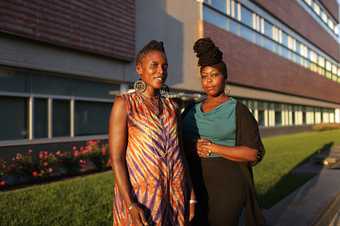MFON: Women Photographers of the African Diaspora is a publication and platform committed to establishing and representing a collective voice of women photographers of African descent. The inaugural issue featured over 100 women photographers from across the Diaspora.
Ahead of the UK release, join its founders Laylah Amatullah Barrayn and Adama Delphine Fawundu together with artists Angélica Dass and Marcia Michael for a discussion about this highly celebrated project and its significance. This panel discussion is one of a series of events leading to a major international conference at Tate Modern in November 2019 dedicated to women and photography.
Biographies
Laylah Amatullah Barrayn
Laylah Amatullah Barrayn is an award-winning documentary and portrait photographer working in the medium for 20 years. She is a frequent contributor to The New York Times, and has been also published in OkayAfrica, BBC, The Washington Post, Le Point Afrique, CBS News, Vogue, among other publications. She has exhibited at Galarie Ethiopiques (Senegal), Brighton Photo Biennial (UK), Galleria Biagiotti (Italy), Open Ateliers Zuidoost Gallery (Holland), Rencontres d’Arles (France) and The Museum of Contemporary Photography (USA) among other institutions. She is a 2017 African Great Lakes Reporting Fellow with the International Women’s Media Foundation. Barrayn also is the co-author of MFON: Women Photographers of the African Diaspora. It is the first publication in nearly 30 years that features photography produced by women of African descent.
Angélica Dass
Angélica Dass is an award-winning photographer living in Madrid, Spain. Originally from Rio de Janeiro, Brazil, she is acutely aware of how small differences in skin tone can swell into large misconceptions and stereotypes about race. She is the creator of the internationally acclaimed Humanæ Project, a collection of portraits that reveal the diverse beauty of human colours. The initiative has travelled to more than 30 countries across six continents —from The World Economic Forum in Davos to the pages of National Geographic — to promote dialogue that challenges how we think about skin colour and ethnic identity.
Angélica’s work transcends the museums and finds in school classrooms a great universe of work. She amplifies the educational message of Humanae through institutional collaborations around the world, such as collaborations with city councils of different cities in the Basque Country, teacher training schools in Madrid, high schools in the Czech Republic, or with UNESCO and the Government of Chile, reaching an impact of more than 50 thousand students in a week. She is also a powerful and inspiring speaker who has lectured at important organizations, such as the University of Salamanca, the University of Bologna, or the UERJ - Rio de Janeiro; as well as the International Congress of Fundraising - The Resource Alliance, at National Geographic and at the World Economic Forum, as a cultural leader.
Delphine Adama Fawundu
Delphine Adama Fawundu is a New York City based multi-media visual artist whose work examines the theory of social constructivism within the development of identity. With this concept in mind, her art investigates the impact of the Transatlantic Slave Trade and Colonialism on social constructs including race, gender and class. Her art appropriates representations of Blackness and African ethnicities while disrupting stagnant ideas about these identities. It queries the fine line between intrinsic identities and the identities evolved from social, political and nationalistic influences.
Marcia Michael
Marcia Michael is a British artist whose practice challenges the presence of the black subject within the auspices of the family album. The Object of My Gaze at Autograph ABP (2018), sees Michael use photography to renew a trans-disciplinary tradition of retrieving past narratives as an act of black matrilineage.
Supported by Fast Forward: Women in Photography at University for the Creative Arts.

